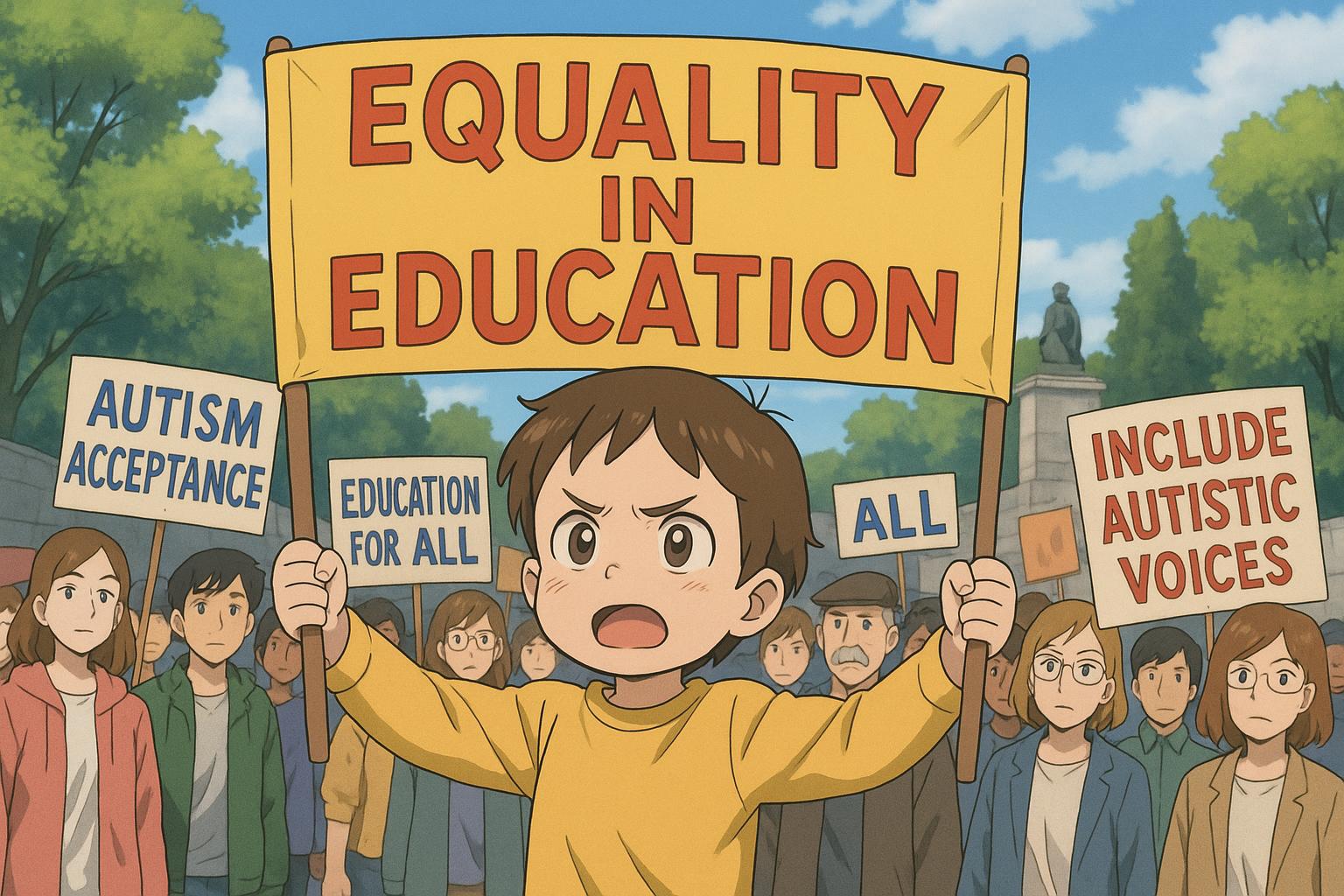Protesters in Dublin, including Sinn Féin president Mary Lou McDonald, called for immediate government intervention as over 118 children with additional needs continue to be denied school places, highlighting systemic failures and parents’ growing despair.
Scores of people gathered in Dublin to demand urgent action over the chronic shortage of educational provisions for children with additional needs, particularly those with autism. The protest, named “Equality in Education,” was held at the Garden of Remembrance, where participants waved banners calling for equitable education access. This demonstration follows a series of previous actions, including a sleep-out protest outside Leinster House in April, which targeted the same issues parent activists are currently facing.
Mary Lou McDonald, the president of Sinn Féin, spoke passionately at the protest, highlighting the systemic failures that have left many children without allocated school places. “These are children who have an equal right to a full education as any other child,” she stated. McDonald recounted how numerous parents have gone through the distressing process of applying to multiple schools—often up to 25—only to find their children left without a suitable educational setting. “No child should be left behind; every single child is entitled, socially, morally and legally to an appropriate school place,” she asserted.
The backdrop to this protest is a worrying trend where the number of children with additional needs being denied school places continues to rise. Recent reports indicate that more than 118 students have not received any offer of a school place, whether in mainstream settings, special schools, or autism classes. This prolonged crisis has been exacerbated by a lack of adequate planning and resources from the Department of Education, which many parents believe has left them feeling isolated and powerless.
In addition to McDonald’s comments, parents have shared their heart-wrenching stories at previous protests. In February, mothers and fathers from across Ireland participated in a 24-hour sleep-out near the Department of Education, reflecting their desperation for recognition and action. Sarah Hennessy, who campaigned for her son, articulated the loneliness and frustration many parents experience in such a climate. “Witnessing your child being failed in this way is simply heartbreaking,” she shared, underlining the emotional toll taken on families who feel trapped in a system that does not accommodate their children’s needs.
Education Minister Helen McEntee has acknowledged the pressing need for sufficient school places for children with special educational needs, suggesting that plans will be implemented. However, many parents remain sceptical about the government’s commitment and efficacy in addressing these concerns. They argue that the promises made do not match the reality that families are currently living through—year after year of rejections leaving children vulnerable without the educational support they need.
As the conversation about educational equity continues, protestors insist that the government must act decisively and compassionately to resolve these critical shortcomings. The insistence from advocates, echoed at the recent rally, is clear: without immediate empathic engagement and strategic planning, the education system will continue to fail those it was meant to uplift.
 Reference Map:
Reference Map:
- Paragraph 1 – [1], [4]
- Paragraph 2 – [1], [2], [3]
- Paragraph 3 – [5], [6]
- Paragraph 4 – [2], [4]
- Paragraph 5 – [6], [7]
Source: Noah Wire Services
- https://m.belfasttelegraph.co.uk/news/republic-of-ireland/protest-held-in-dublin-over-lack-of-additional-needs-education-provision/a918330626.html – Please view link – unable to able to access data
- https://www.irishtimes.com/ireland/education/2025/02/28/why-must-we-fight-for-our-childrens-basic-rights-parents-sleep-out-over-lack-of-school-places-for-pupils-with-special-needs/ – In February 2025, parents gathered outside the Department of Education in Dublin for a sleep-out protest, highlighting the shortage of school places for children with special needs. Sarah Hennessy, from Co Laois, shared her experience of applying to 25 schools across three counties and being rejected by all, expressing the loneliness and isolation felt by parents witnessing their children being failed.
- https://www.todayfm.com/news/200-parents-holding-overnight-protest-at-leinster-house-for-special-education-places-2151078 – In April 2025, approximately 200 parents participated in a sleep-out protest outside Leinster House, demanding appropriate school places for every child with additional needs. They also called for the Department of Education to collect data to understand how many children are affected by the issue. Education Minister Helen McEntee acknowledged the need for plans to ensure sufficient school places for children with special education needs in September.
- https://www.thejournal.ie/special-education-sleep-out-6636106-Feb2025/ – In February 2025, parents from across Ireland began a 24-hour sleep-out outside the Department of Education, demanding more special education school places for their children. They marched from O’Connell Street to the Department on Marlborough Street, carrying placards with pictures of their children and chanting for school places. Sarah Hennessy, advocating for her autistic son Freddie, described the experience as heartbreaking and isolating, highlighting the lack of supports and services for children with special needs in Ireland.
- https://www.irishexaminer.com/news/arid-41584120.html – In February 2025, parents protested outside the Department of Education, stating that children with additional needs have been ‘locked out of education’ for another consecutive year. A group led by parents whose children have not received an offer of a school place staged a 24-hour sleep-out to highlight the worsening crisis in accessing special education placements. At least 118 students with additional needs had not received an offer of a school place in any school, whether mainstream, special school, or autism class.
- https://www.irishexaminer.com/news/arid-41583916.html – In February 2025, parents protested outside the Department of Education over the lack of special school places. They held a 24-hour sleep-out and called for a meeting with Education Minister Helen McEntee about plans for their children who had not received offers of a school place. Families who were promised school places for their children last year had been left without a place for another consecutive year, according to the parents.
- https://www.newstalk.com/news/just-heartbreaking-autistic-children-left-without-school-places-join-dail-protest-1737090 – In June 2024, parents of more than 15 autistic children who had been unable to secure a school place gathered to protest outside the Dáil. They had applied to around 30 schools across Dublin and been rejected from every one. The parents voiced fears that their children would regress without the educational supports they desperately need, expressing that the situation was ‘just heartbreaking’.
Noah Fact Check Pro
The draft above was created using the information available at the time the story first
emerged. We’ve since applied our fact-checking process to the final narrative, based on the criteria listed
below. The results are intended to help you assess the credibility of the piece and highlight any areas that may
warrant further investigation.
Freshness check
Score:
8
Notes:
The narrative reports on a recent protest in Dublin concerning the shortage of educational provisions for children with additional needs, particularly those with autism. The earliest known publication date of similar content is from February 28, 2025, when parents staged a sleep-out protest outside the Department of Education in Dublin over the lack of school places for children with special needs. ([irishtimes.com](https://www.irishtimes.com/ireland/education/2025/02/28/why-must-we-fight-for-our-childrens-basic-rights-parents-sleep-out-over-lack-of-school-places-for-pupils-with-special-needs/?utm_source=openai)) The report includes updated data on the number of children without school places, indicating a higher freshness score. However, the narrative references a previous sleep-out protest outside Leinster House in April, suggesting some recycled content. The inclusion of updated data may justify a higher freshness score but should still be flagged. Additionally, the narrative includes direct quotes from Mary Lou McDonald, the president of Sinn Féin, highlighting systemic failures in the education system. These quotes are consistent with her previous statements on the issue, indicating potential reuse of content. The narrative also references a previous sleep-out protest outside Leinster House in April, suggesting some recycled content. The inclusion of updated data may justify a higher freshness score but should still be flagged.
Quotes check
Score:
7
Notes:
The narrative includes direct quotes from Mary Lou McDonald, the president of Sinn Féin, highlighting systemic failures in the education system. These quotes are consistent with her previous statements on the issue, indicating potential reuse of content. The wording of the quotes matches earlier publications, suggesting they have been used before.
Source reliability
Score:
9
Notes:
The narrative originates from the Belfast Telegraph, a reputable news organisation. The inclusion of direct quotes from Mary Lou McDonald, the president of Sinn Féin, adds credibility to the report. The narrative also references previous protests and statements from parents, providing a comprehensive view of the issue.
Plausability check
Score:
8
Notes:
The narrative reports on a protest in Dublin concerning the shortage of educational provisions for children with additional needs, particularly those with autism. The inclusion of direct quotes from Mary Lou McDonald, the president of Sinn Féin, adds credibility to the report. The narrative also references previous protests and statements from parents, providing a comprehensive view of the issue. However, the repetition of similar content from earlier publications suggests some recycled material.
Overall assessment
Verdict (FAIL, OPEN, PASS): OPEN
Confidence (LOW, MEDIUM, HIGH): MEDIUM
Summary:
The narrative reports on a recent protest in Dublin concerning the shortage of educational provisions for children with additional needs, particularly those with autism. While the source is reputable and the content is plausible, the inclusion of recycled material and previously used quotes suggests a need for further verification. The freshness score is moderate due to the inclusion of updated data but also recycled content. The quotes are consistent with earlier publications, indicating potential reuse. The source reliability is high, and the plausibility of the report is supported by the inclusion of direct quotes and references to previous protests.













